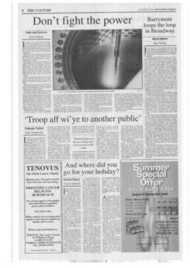Page 6, 25th August 2000
Page 6

Report an error
Noticed an error on this page?If you've noticed an error in this article please click here to report it.
Tags
Share
Related articles
Why There Was Nothing 'glorious' About 1688
Today's Disquieting Elizabethan Echoes
The Human Side Of Protestant Ireland
Blaming The Empire For The World's Woes
Playing With The Fires Of Nationalism
An inglorious settlement
David Twiston Davies
TtiE Glorious Revoluon has traditionally posed a problem for Catholics. Unlike the Reformation, which even stmng Protestants admit had some ill effects, the political settlement reached after James II lost the throne in 1688 has been generally accepted as a key constitutional event of our parliamentary history.
Macaulay's History of England put the case for it being the "most beneficent revolution" and "a vindication of ancient rights" so trenchantly that it still exercises a mesmerising influence over protestant and even hostile Catholic minds 150 years later.
Of course, Catholics have never accepted that James was bent on introducing absolute government or compulsory Catholicism. Yet such was the stability that subsequently occurred, that they have avoided thinking about it.
However, in recent decades, historians have whittled away the assumptions involved, and now the great Jacobite scholar Eveline Cruikshanks has summed up the case in a university textbook, The Glorious Revolution, published in the series British History in Perspective. This is an assault on the traditional protestant view that matches Eamon Duffy's The Stripping of the Altars, which demonstrated the Church's good health at the Reformation.
With little more than 100 pages at her disposal Dr Cruikshanks only touches on the jerky course of James's brief reign. one that made Englishmen prepared to countenance intervention from outside. She points out that he was driven by the need to introduce toleration for all Christians before one of his protestant daughters succeeded to the throne. In the event it was the birth of his Catholic son that precipitated the crisis.
James's misfortune was that fear of popery was so ingrained that many dissenters distrusted his promises and sided with the Anglicans, who still excluded them from the political process. The settlement was both confused and inglorious. The peers who invited James's sonin-law, William of Orange, to come were not particularly representative, and the populace was not enamoured by his arrival with a large army for which they then had to pay. The presence of many Catholics in its ranks hardly supported claims that William was "the great deliverer". William's policy was driven primarily by a need to create a coalition with the great Catholic powers against the French, something to which even Pope Innocent X1 acquiesced on the unfulfilled assurance that Catholics would receive toleration.
The people of these islands may have been desperate to avoid another civil war, but if they really abominated the Stuarts they would surely have refused to countenance a restoration. But most major leaders, from William to Sir Robert Walpole, had contacts with the exiled family over the next 55 years. Although the myth came to be accepted, the tepid celebrations of the 300th anniversary in 1989 suggest a continuing uneasy unconscienc,e; I was interested to find myself quizzed on three separate occasions while reading this book on a train.
What would have happened if the Stuarts had returned? Catholics would not have had to wait until the 19th century for their full political rights. Dr Cruikshanks also points to the wealth of talent that left England. Scotland and, particularly, Ireland to follow the Stuarts. The sophisticated banking network formed by Jacobites makes nonsense of assumptions about Catholicism being inimical to capitalism. There is no reason to think that the British imperial expansion would have been any different.
Dr Cruikshanks fuels the case for repealing those acts of Parliament that bar a Catholic from the throne. It is dispiriting to realise that the main barrier is the festering Irish situation which the Smarts alone might have healed.
blog comments powered by Disqus













